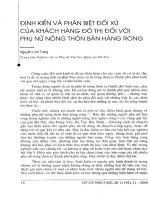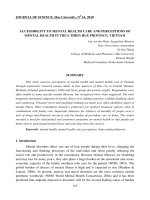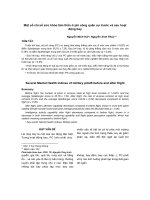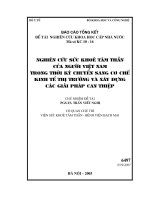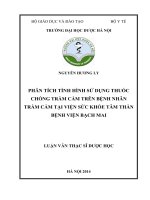Liên quan giữa Sự kỳ thị và phân biệt đối xử bệnh AIDS với sức khỏe tâm thần ở những người sống chung với HIV ở Campuchia
Bạn đang xem bản rút gọn của tài liệu. Xem và tải ngay bản đầy đủ của tài liệu tại đây (441.24 KB, 25 trang )
Association of AIDS Stigma and Discrimination
with Mental Disorders among People Living with
HIV in Cambodia
Presented by: Pheak
Chhoun, MPH
Research Fellow, Center for Population Health Research
Investigators:
KHANA (Cambodia): Siyan Yi, Pheak Chhoun, Samedy Suong1, Kouland Thin, Sovannary Tuot
Touro University California (USA): Siyan Yi, Carinne Brody
7th ICPH, Hue City, Vietnam | 26-27 September 2015
1
AIDS-related stigma among PLHIV
• AIDS-related stigma and discrimination impede millions
of PLHIV from accessing and benefiting from effective
prevention and treatment services
– Approximately 50–60% of HIV-infected people are unaware of
their sero-status, and many choose to hide it
(Grossman & Stangl, 2013 and Sidibé & Goosby, 2013)
• AIDS-related stigma and discrimination have been
found to be associated with
–
–
–
–
–
delays in seeking care
potential barriers to HIV counselling and testing
disclosure of HIV sero-status
retention in care and treatment
uptake of and adherence to antiretroviral therapy (ART)
2
Mental health among PLHIV
• Point prevalence rates of major depressive disorder
among PLHIV: 3% - 54%
(Adewaya et al., 2007; Akena et al., 2012)
• Mental disorders are also associated with several health
and healthcare seeking behaviors such as:
– poor adherence to medications
– low rates of retention in ART care
– poor ART-related clinical outcomes
(Springer et al., 2012)
3
Rationale and Objective
• Rationale:
– Limited attention to AIDS-related stigma and
discrimination as well as mental disorders
– The linkage between these two problems has not been
well addressed
– There is no study on this issue in Cambodia
• Objective: to examine the association of AIDS-related
stigma and discrimination with mental disorders among
PLHIV in Cambodia
4
Map of Study Site
5
Study sites and sampling:
• Sample size: 1,003 adult PLHIV
• Data collection period: May 2014
• Sampling: Two-stage cluster sampling (probability proportional-to-size
wasused to select the required number of PLHIV from each province)
• Inclusion Criteria:
– Men or women aged 18 years or older
– Having been registered as a PLHIV within the network of the
community based implementing partner
– Being able to provide consent to participate in the study
– Being able to present themselves on the day of the data collection
• Exclusion Criteria:
– PLHIV who were mentally and/or physically too sick to participate in
the study
6
Variables and measurement
•
•
•
•
•
Socio-economic characteristics
Social support
Pre-ART/ART services
Mental disorders (GHQ-12)
Perceived AIDS-related stigma and discrimination
(People Living with HIV Stigma Index)
7
Data Analyses
• Double data entry: EpiData
• Bivariate analyses:
– Chi-square or Fisher’s Exact test for categorical variables
comparison
– Student’s t-test or ANOVA for continuous variables
• Multivariable logistic regression model
– Control the effects of potential confounders
– Including all variables associated with level of mental
disorders in bivariate analyses at the level of p< 0.10
– Soft wares: SPSS version 22
8
Ethical Considerations
• Ethical approval:
– National Ethics Committee for Health Research
(NECHR)
• Written informed consent: All participants
• Confidentiality & privacy protection:
– No personal identifier collected
– Interviews at private places
9
Comparisons of socio-demographic
characteristic with level of mental disorders
Total score of GHQ-12
Socio-demographic
characteristics
Total
≤3
≥4
n (%)
n (%)
n (%)
OR (95% CI)
Gender
Male
329 (32.8)
242 (38.8)
85 (22.5)
Ref
Female
674 (67.2)
381 (61.2)
292 (77.5)
2.2 (1.6-2.9)
≤ 43 years
510 (50.7)
320 (51.3)
190 (50.3)
Ref
> 43 years
495 (49.3)
304 (48.7)
188 (49.7)
1.1 (0.8-1.3)
≥ 5 years
567 (56.4)
293 (47.0)
144 (38.1)
Ref
< 5 years
438 (43.6)
331 (53.0)
234 (61.9)
1.4 (1.1-1.9)
Age group
Formal education completed
Comparisons of socio-demographic
characteristic with level of metal disorder (cont)
Total score of GHQ-12
Socio-demographic
characteristics
Total
≤3
≥4
n (%)
n (%)
n (%)
OR (95% CI)
Marital status
Married
630 (62.8)
405 (65.1)
223 (59.0)
Ref
Unmarried
373 (37.2)
217 (34.9)
155 (41.0)
1.4 (1.1-1.7)
Employed
880 (87.6)
563 (90.2)
314 (83.3)
Ref
Unemployed
124 (12.4)
61 (9.8)
63 (16.7)
> US$75
565 (56.8)
277 (44.8)
152 (40.6)
Ref
≤ US$75
430 (43.2)
341 (55.2)
222 (59.4)
1.5 (1.1-1.5)
Current employment status
1.9 (1.3-2.7)
Average monthly income
Comparisons of socio-demographic
characteristic with level of metal disorder (cont)
Total score of GHQ-12
Socio-demographic
characteristics
Total
≤3
≥4
n (%)
n (%)
n (%)
OR (95% CI)
Duration of living with HIV
≤ 8 years
520 (51.7)
328 (52.6)
891 (50.5)
Ref
> 8 years
485 (48.3)
296 (47.4)
187 (49.5)
1.1 (0.8-1.4)
Spouse/partner’s HIV status (for married PLHIV)
Negative
197 (22.9)
141 (25.9)
56 (15.9)
Ref
Positive
663 (77.1)
404 (74.1)
256 (82.1)
1.6 (1.1-2.3)
77 (8.8)
54 (9.9)
22 (6.9)
Ref
794 (91.2)
494 (90.1)
298 (93.1)
1.5 (1.1-2.5)
Spouse/partner knows your HIV status
No
Yes
Comparisons of socio-demographic
characteristic with level of metal disorder (cont)
Total score of GHQ-12
Socio-demographic
characteristics
Total
≤3
≥4
n (%)
n (%)
n (%)
OR (95% CI)
Currently on ART treatment
No
36 (3.6)
26 (4.2)
10 (2.7)
Ref
Yes
958 (96.4)
589 (95.8)
366 (97.3)
1.6 (0.8-3.4)
> 500
512 (51.8)
304 (49.4)
170 (45.9)
Ref
≤ 500
477 (48.2)
312 (50.6)
200 (54.1)
1.1 (0.9-1.5)
CD4 count at the most recent blood test
Received social support in the past 12 months
Yes
956 (95.2)
599 (96.1)
354 (93.7)
Ref
No
48 (4.8)
24 (3.9)
24 (6.3)
1.7 (1.1-3.0)
Prevalence of Stigma and discrimination experiences
in family and community in the past 12 months
4 2.3
20.7
13
12.1
8
6 .9
13 .2
11.3
7 .4
8.2
9 .4
5
4 .8
2.3
13 .2
2.1
3 .2
0.8
t
t
e
s
d
b
n
n
n
n
er
ed
ed
ed
IV
on
ac
jo
en
io
io
ou
lte
ice
ss
tn
tio
ss
at
sio
pl
cti
m
ot
at
ab
ec
of
rv
LH
au
ra
ra
ar
c
in
lu
u
j
e
y
e
s
r
r
P
m
c
p
e
d
s
u
d
g
o
s
s
e
e
x
r
as
ro
ha
pl
ha
ed
lr
r im
m
an
th
he
Lo
sip
se
ro
rp
ua
or
m
al
isc
om
lly
ch
em
ot
lly
f
o
os
e
r
o
tie
d
a
x
a
r
f
i
i
i
d
f
g
o
r
h
t
f
g
re
by
sic
Se
g
fo
lte
sic
ed
tiv
tiv
tiv
ed
ed
in
su
ed
su
ted
hy
ac
ac
ed
nt
ac
us
ein
hy
ni
ted
be
re
rc
s
e
P
f
n
n
l
b
e
P
s
a
P
i
o
e
e
y
r
u
v
d
f
f
r
u
l
f
e
il
in
cia
be
ev
g
g
g
io
re
pr
ba
m
eo
pr
So
g
g
em
er
ein
lig
r im
ein
ein
ar
Fa
n
g
e
c
n
V
i
B
s
i
m
B
B
R
e
di
Aw
ein
be
B
ily
g
B
ild
m
ein
a
h
F
C
B
lu
xc
e
s
tie
n
sio
lu
xc
e
s
tie
n
sio
14
Comparisons of stigma and discrimination
experienced in communities in the past 12 months
Total score of GHQ-12
Stigma and discrimination
experiences
Total
n (%)
≤3
n (%)
≥4
n (%)
OR (95% CI)
Physically harassed and/or threatened
No
925 (92.0)
595 (95.4)
327 (86.5)
Ref
Yes
80 (8.0)
29 (4.6)
51 (13.5)
3.2 (2.0-5.1)
Subjected to psychological pressure by your husband/wife or partner
No
883 (87.9)
578 (92.6)
302 (79.9)
Ref
Yes
122 (12.1)
46 (7.4)
76 (20.1)
3.2 (2.1-4.7)
Forced to change your place of residence or unable to rent accommodation
No
973 (96.8)
610 (97.8)
360 (95.2)
Ref
Yes
32 (3.2)
14 (2.2)
18 (4.8)
2.2 (1.1-4.4)
Comparisons of stigma and discrimination
experienced in communities in the past 12 months
Total score of GHQ-12
Stigma and discrimination
experiences
Total
n (%)
≤3
n (%)
≥4
n (%)
OR (95% CI)
Refused employment or a work opportunity because of HIV status
No
872 (87.0)
569 (91.2)
300 (79.4)
Ref
Yes
133 (13.2)
55 (8.8)
78 (20.6)
2.7 (1.9-3.9)
Nature of work been changed, or been refused promotion as a result of HIV status
No
872 (86.8)
564 (90.4)
305 (80.7)
Ref
Yes
133 (13.2)
60 (9.6)
73 (19.3)
2.3 (1.6-3.3)
Your child had been prevented from attending school because of your HIV status
No
954 (95.0)
603 (96.6)
348 (92.3)
Ref
Yes
50 (5.0)
21 (3.4)
29 (7.7)
2.4 (1.3-4.3)
Prevalence of self-reported internal stigma
experienced in the past 12 months
70
59.6
60
53.1
50
46 .3
45.9
42.9
40
35.5
31.1
30
22.3
20
16 .8
10 .1
10
6 .9
4.9
0
e
Fe
l in
s
ga
m
ha
ed
e
Fe
lin
ui
gg
l ty
Se
am
Bl
l f-
e
B
m
la
in
th
go
s
er
vi
Ha
l
ng
e
Fe
ow
g
li n
se
th
at
e
te
es
l fs
ey
th
m
ul
ho
d
be
pu
s
ni
he
d
Fe
i
os
Ch
in
el
ng
gs
ci d
ui
e
att
to
t
no
al
nd
s
at
lg
ic a
o
I
r
he
in
g
ng
lo ati
s
fam
i ly
/
e
fri
De
D
nd
ci d
i
ec
s
in
p
to
os
t
g
n
di
g
W
6 .1
4.9
rk
wo
pp
oa
t
t
no
i th
al
aw
r
d
in
l
g
or
yf
m
fro
m
ro
/p
b
jo
ed
4.4
on
oti
in
ra
/t
n
o
ati
uc
in
p
go
D
u
rt
po
id
ec
ni
in
g
2.8
ty
m
et
og
t
t
no
r
ar
De
ci
ie
d
n
di
g
ci d
De
o
tt
no
in
g
ve
ha
oh
tt
o
n
x
se
e
av
(m
d
oi
Av
in
e)
or
g
ch
in
go
ild
n
re
oa
gt
n
cl i
al
c
lo
sp
ho
/
ic
l
i ta
Comparisons of internal stigma experiences in the
past 12 months among PLHIV
Total score of GHQ-12
Internal Stigma
Total
≤3
≥4
experiences
n (%)
n (%)
n (%)
OR (95% CI)
I feel ashamed
No
543 (51.4)
381 (61.1)
160 (42.4)
Ref
Yes
461 (45.9)
243 (38.9)
217 (57.6)
2.1 (1.6-2.8)
No
779 (77.7)
520 (83.5)
256 (67.9)
Ref
Yes
224 (22.3)
103 (16.5)
121 (32.1)
2.4 (1.8-3.2)
No
955 (95.1)
610 (97.8)
342 (90.7)
Ref
Yes
49 (4.9)
14 (2.2)
35 (9.3)
4.5 (2.4-8.4)
I have low self-esteem
I feel suicidal
Comparisons of internal stigma experiences in the
past 12 months among PLHIV
Total score of GHQ-12
Internal Stigma
experiences
Total
n (%)
≤3
n (%)
≥4
n (%)
OR (95% CI)
I isolated myself from my family and/or friends
No
936 (93.1)
599 (96.0)
334 (88.4)
Ref
Yes
69 (6.9)
25 (4.0)
44 (11.6)
3.2 (1.9-5.3)
No
956 (95.1)
607 (97.3)
347 (91.8)
Ref
Yes
49 (4.9)
17 (2.7)
31 (8.2)
3.2 (1.7-5.8)
I made the decision to stop working
Comparisons of fear of stigma and discrimination
experienced in the past 12 months
Fears of stigma and
discrimination
Total score of GHQ-12
Total
≤3
≥4
n (%)
n (%)
n (%)
OR (95% CI)
Having been fearful of the following things happening to you:
Being gossiped about
No
658 (65.5)
451 (72.3)
204 (54.0)
Ref
Yes
347 (34.5)
173 (27.7)
174 (46.0)
2.2 (1.7-2.9)
Being verbally insulted, harassed, or threatened
No
758 (75.4)
511 (81.9)
244 (64.6)
Ref
Yes
247 (24.6)
113 (18.1)
134 (35.4)
2.5 (1.9-3.3)
Being physically harassed and/or threatened
No
849 (84.5)
557 (89.3)
289 (76.5)
Ref
Yes
156 (15.5)
67 (10.7)
89 (23.5)
2.6 (1.8-3.6)
Comparisons of fear of stigma and discrimination
experienced in the past 12 months
Total score of GHQ-12
Fears of stigma and
discrimination
Total
n (%)
≤3
n (%)
≥4
n (%)
OR (95% CI)
Being physically assaulted
No
Yes
865 (86.1)
140 (13.9)
565 (90.5)
297 (78.6)
Ref
59 (9.5)
81 (21.4)
2.6 (1.8-3.8)
527 (84.7)
307 (82.1)
Ref
95 (15.3)
67 (17.9)
1.2 (0.9-1.7)
Being rejected to have sexually intimate with
No
Yes
837 (83.8)
162 (16.2)
Results of univariate and multivariate logistic regression
analyses of the association between stigma and discrimination
with levels of mental disorders among PLHIV
Stigma and discrimination
scales
Total score of GHQ-12
≤3
≥4
n (%)
n (%)
OR (95% CI)
AOR (95% CI)†
Total score of stigma and discrimination experience
≤2
468 (75.2)
210 (56.1)
Ref
Ref
≥3
154 (24.8)
164 (43.9)
2.4 (1.8-3.1)***
1.9 (1.4-2.6) ***
≤4
434 (70.1)
196 (52.1)
Ref
Ref
≥5
185 (29.9)
180 (47.9)
2.2 (1.7-2.8) ***
1.7 (1.2-2.3) **
Total score of internal stigma
Total score of fear of stigma and discrimination
≤1
492 (79.1)
237 (63.4)
Ref
Ref
≥2
130 (20.9)
137 (36.6)
2.2 (1.6-2.9) ***
1.5 (1.1-2.2)*
Limitation of the study
• Representativeness of the study population
• GHQ-12 was not a diagnostic instrument
• Cross-sectional design precludes interpretation
of the findings
• Unknown validity of the tools
• Self-reported measures: Underreporting and
over-reporting
• Possibility of recall bias
Conclusions
• AIDS-related stigma and discrimination among
PLHIV in Cambodia may have potential impacts
on their mental health conditions
• Community-based interventions to reduce the
stigma and discrimination in the general public
and to help PLHIV to cope with this situation
are needed
Acknowledgement
•
•
•
•
NCHADS
PHDs, ODs
USAID
Implementing partners and their staff
members
• Study participants, local authorities
• Research team members


